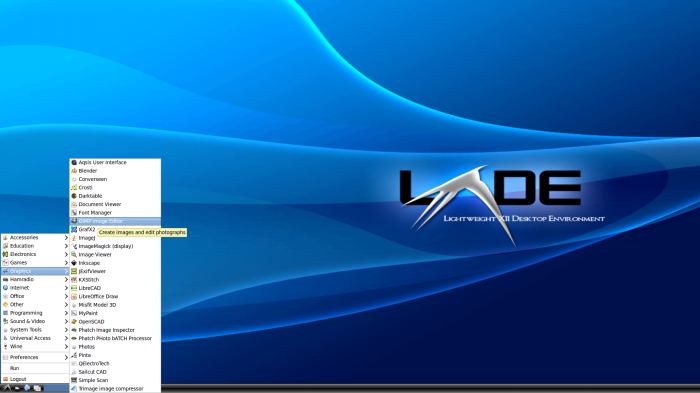Last Updated on May 19, 2022
LXDE (Lightweight X11 Desktop Environment) is a project with an objective of providing a desktop environment which is lightweight and fast. It is not designed to be powerful and bloated, but to be usable and slim enough, and keep the resource usage low. Different from the majority of desktop environments, it does not tightly integrate every component. Instead, it tries to make all components independent, and each of them can be used independently with few dependencies.
This means that users do not need to install the whole desktop, but they can select the parts that they like for their own customized desktop.
LXDE is designed to work well with computers on the low end of the performance spectrum such as the new generation netbooks and other small computers. LXDE is energy efficient and fast compared to other desktops. LXDE can be built on top of various Linux distributions such as Ubuntu or Debian.
The gOS LXDE edition (good OS) uses the gOS concept of Web 2.0 Apps alongside the extremely fast LXDE desktop interface.
Features include:
- Lightweight, runs with reasonable memory usage.
- Good-looking, gtk+ 2 internationalized user interface.
- Easy-to-use, the user interface is simple, but usable enough.
- Desktop independent (Every component can be used without LXDE).
- Standard compliant, follows the specs on freedesktop.org.
- Suitable for old machines.
Components include:
- PCMan, an extremely fast and lightweight file manager with tabbed browsing (like Firefox), built-in volume management, built-in file searching, drag & drop, thumbnails, and more.
- LXLauncher, easy-mode application launcher which follows freedesktop.org specs.
- LXPanel, a feature-rich desktop panel based on fbpanel.
- LXSession, session manager.
- LXAppearance, GTK+ theme switcher.
- leafpad, simple text editor.
- Xarchiver, third-party desktop-independent file archiver.
- GPicView, a fast, simple image viewer.
- LXTerminal, terminal emulator.
- LXTask, task manager derived from xfce4 task manager.
- LXNM, lightweight network connection helper daemon for LXDE supporting wireless connections (Linux-only).
- Openbox, third-party window manager.
Website: lxde.org
Support: Forums
Developer: The LXDE Team
License: GNU GPL, LGPL

LXDE is written in C. Learn C with our recommended free books and free tutorials.
Return to Lean Desktop Environments | Return to Desktop Environments Home Page
| Popular series | |
|---|---|
| The largest compilation of the best free and open source software in the universe. Each article is supplied with a legendary ratings chart helping you to make informed decisions. | |
| Hundreds of in-depth reviews offering our unbiased and expert opinion on software. We offer helpful and impartial information. | |
| The Big List of Active Linux Distros is a large compilation of actively developed Linux distributions. | |
| Replace proprietary software with open source alternatives: Google, Microsoft, Apple, Adobe, IBM, Autodesk, Oracle, Atlassian, Corel, Cisco, Intuit, SAS, Progress, Salesforce, and Citrix | |
| Awesome Free Linux Games Tools showcases a series of tools that making gaming on Linux a more pleasurable experience. This is a new series. | |
| Machine Learning explores practical applications of machine learning and deep learning from a Linux perspective. We've written reviews of more than 40 self-hosted apps. All are free and open source. | |
| New to Linux? Read our Linux for Starters series. We start right at the basics and teach you everything you need to know to get started with Linux. | |
| Alternatives to popular CLI tools showcases essential tools that are modern replacements for core Linux utilities. | |
| Essential Linux system tools focuses on small, indispensable utilities, useful for system administrators as well as regular users. | |
| Linux utilities to maximise your productivity. Small, indispensable tools, useful for anyone running a Linux machine. | |
| Surveys popular streaming services from a Linux perspective: Amazon Music Unlimited, Myuzi, Spotify, Deezer, Tidal. | |
| Saving Money with Linux looks at how you can reduce your energy bills running Linux. | |
| Home computers became commonplace in the 1980s. Emulate home computers including the Commodore 64, Amiga, Atari ST, ZX81, Amstrad CPC, and ZX Spectrum. | |
| Now and Then examines how promising open source software fared over the years. It can be a bumpy ride. | |
| Linux at Home looks at a range of home activities where Linux can play its part, making the most of our time at home, keeping active and engaged. | |
| Linux Candy reveals the lighter side of Linux. Have some fun and escape from the daily drudgery. | |
| Getting Started with Docker helps you master Docker, a set of platform as a service products that delivers software in packages called containers. | |
| Best Free Android Apps. We showcase free Android apps that are definitely worth downloading. There's a strict eligibility criteria for inclusion in this series. | |
| These best free books accelerate your learning of every programming language. Learn a new language today! | |
| These free tutorials offer the perfect tonic to our free programming books series. | |
| Linux Around The World showcases usergroups that are relevant to Linux enthusiasts. Great ways to meet up with fellow enthusiasts. | |
| Stars and Stripes is an occasional series looking at the impact of Linux in the USA. | |